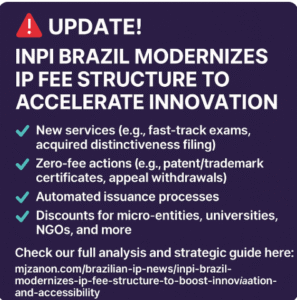In a decisive move to modernize its industrial property services, Brazil’s National Institute of Industrial Property (INPI) has unveiled a comprehensive new Pricing Policy, formalized by GM/MDIC Ordinance No. 110/2025 and INPI/PR Ordinance No. 10/2025. This regulatory reform aligns with international best practices and responds to critical demands for greater transparency, equity, and strategic alignment in IP service delivery.
A Cost-Based, Periodically Reviewed Framework
Unlike legacy pricing systems often criticized for opacity or outdated logic, Brazil’s new policy adopts a cost-based methodology, combined with quadrennial review cycles. The review process is anchored in INPI’s long-term strategic plan, ensuring adaptive governance that evolves with national innovation dynamics and global benchmarking standards. This shift brings the Brazilian IP system in line with the practices of many leading IP offices, strengthening institutional credibility and enhancing predictability for domestic and international users.
Differentiation by Complexity and Public Interest
Crucially, the policy introduces a nuanced structure where pricing is differentiated not just by the type of service, but by its complexity and execution time. Services demanding greater technical and human resource investment will carry fees proportionate to their demands — a move that improves internal resource planning and reinforces procedural integrity.
Simultaneously, the policy offers strategic fee reductions for innovation stakeholders critical to national development — including:
- Micro and small enterprises;
- Public universities;
- Government-linked research institutions.
This preferential access mechanism promotes greater participation by underrepresented innovators, supporting the inclusive innovation ecosystem envisioned in Brazil’s National IP Strategy (ENPI) and the New Industry Brazil (NIB) initiative.
Transparency and Global Engagement
The policy is part of a broader movement toward digital governance and transparency at INPI. It exemplifies how IP offices in emerging economies can adopt forward-thinking, user-centric regulatory strategies without compromising financial sustainability. Furthermore, this reform strengthens Brazil’s position in the global IP landscape. For foreign IP offices, it provides a model of how administrative pricing can be deployed as a tool of innovation policy, balancing fiscal responsibility with strategic national development goals.
Conclusion: A Signal of Maturity and Vision
As Brazil repositions itself as a hub of innovation in Latin America, the reform of INPI’s pricing structure is more than administrative housekeeping — it is a strategic maneuver designed to enhance institutional agility, widen access to IP protection, and reinforce Brazil’s innovation infrastructure.
For international IP offices, Brazil’s experience offers valuable insights on:
- Structuring sustainable, inclusive pricing models;
- Aligning IP policy with national innovation strategies;
- Enhancing procedural transparency without regulatory burden.
As MJZanon – IP Attorney-At-Law, we recommend foreign IP agencies take note of this high-impact policy shift as an example of proactive, mission-aligned IP governance in practice.
Latest posts
- Brazil’s Health Authority Publishes Guidance on Monitoring International Health Regulation (IHR) Core Capacities at Designated Points of Entry
- Brazil’s Data Protection Authority Sets the Regulatory Agenda for 2026–202
- Examination Framework for Trademarks: What Global IP Owners Need to Know in 2025
- Brazil’s 2025 Trademark Reform
- Rare Minerals: Brazil’s Strategic Leap into the Clean-Energy Geopolitics
Sources
- INPI Brasil — LinkedIn (post): “Nova Política de Preços do INPI…” (perfil oficial). Abrir o post
- INPI — Precificação dos Serviços (hub oficial): visão geral, metodologia, materiais e FAQs. gov.br/inpi • Precificação
- Portaria GM/MDIC nº 110/2025 e Portaria INPI/PR nº 10/2025 — base legal e tabela completa (PDF). Tabela de Retribuições (PDF)
- INPI — Descontos da nova Tabela: notícia oficial (vigência 07/08/2025). Notícia sobre descontos
- Comparativo de Preços: PDF oficial (valores atual × novo). Comparativo (PDF)
Note on numbering: as fontes oficiais indicam GM/MDIC nº 110/2025 e INPI/PR nº 10/2025 como base da política/tabela; “MDIC nº 256/2025” não aparece no hub oficial.

